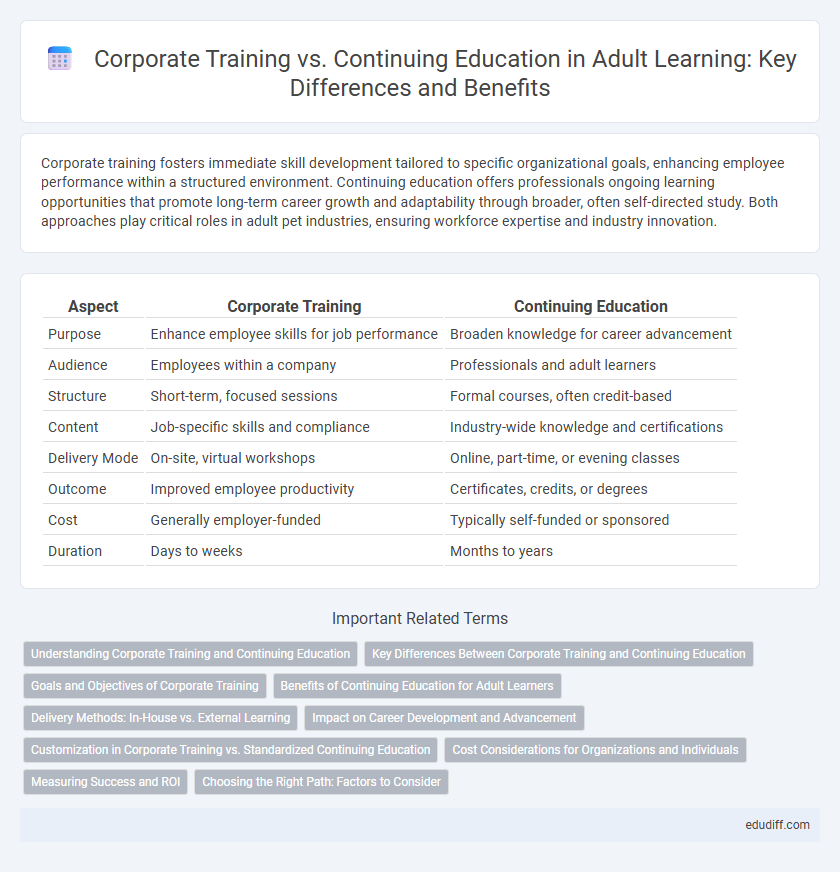Corporate training fosters immediate skill development tailored to specific organizational goals, enhancing employee performance within a structured environment. Continuing education offers professionals ongoing learning opportunities that promote long-term career growth and adaptability through broader, often self-directed study. Both approaches play critical roles in adult pet industries, ensuring workforce expertise and industry innovation.
Table of Comparison
| Aspect | Corporate Training | Continuing Education |
|---|---|---|
| Purpose | Enhance employee skills for job performance | Broaden knowledge for career advancement |
| Audience | Employees within a company | Professionals and adult learners |
| Structure | Short-term, focused sessions | Formal courses, often credit-based |
| Content | Job-specific skills and compliance | Industry-wide knowledge and certifications |
| Delivery Mode | On-site, virtual workshops | Online, part-time, or evening classes |
| Outcome | Improved employee productivity | Certificates, credits, or degrees |
| Cost | Generally employer-funded | Typically self-funded or sponsored |
| Duration | Days to weeks | Months to years |
Understanding Corporate Training and Continuing Education
Corporate training emphasizes skill development tailored to specific organizational goals, enhancing employee performance and productivity within the company. Continuing education focuses on personal and professional growth beyond the workplace, offering certifications and advanced knowledge that support long-term career advancement. Both approaches foster lifelong learning but differ in scope, with corporate training aligning closely with immediate business needs and continuing education promoting broader skillsets and adaptability.
Key Differences Between Corporate Training and Continuing Education
Corporate training primarily targets skill enhancement tailored to specific job roles within an organization, emphasizing immediate application and performance improvement. Continuing education offers broader academic or professional development opportunities aimed at long-term career growth and personal enrichment beyond specific workplace needs. Corporate training is usually employer-sponsored and short-term, while continuing education often involves self-directed learning and longer-term commitments.
Goals and Objectives of Corporate Training
Corporate training primarily aims to enhance employee skills and productivity aligned with organizational goals, focusing on job-specific competencies and performance improvement. It targets immediate application of skills to drive business outcomes such as increased efficiency, reduced errors, and higher customer satisfaction. Emphasizing measurable results, corporate training programs are designed to support strategic objectives, employee development, and overall company growth.
Benefits of Continuing Education for Adult Learners
Continuing education offers adult learners flexible schedules and practical skill development that align with current industry demands, enhancing career advancement opportunities. It promotes lifelong learning by updating professionals on the latest trends and technologies, increasing job security and earning potential. Employers often value continuing education credentials, making it a strategic investment for adult learners seeking to remain competitive in evolving job markets.
Delivery Methods: In-House vs. External Learning
In-house corporate training offers tailored delivery methods that align directly with company culture and immediate business goals, often featuring interactive workshops and hands-on sessions led by internal experts. External continuing education programs provide diverse delivery formats such as online courses, webinars, and certification programs designed by industry specialists, enabling broader skill acquisition and networking opportunities. Choosing between these delivery methods hinges on the organization's need for customization, cost-efficiency, and the desired scope of employee development.
Impact on Career Development and Advancement
Corporate training provides targeted skill development aligned with specific company goals, enhancing an employee's performance and opportunities for internal promotion. Continuing education offers broader academic knowledge and credentials that expand professional expertise and eligibility for diverse career paths. Both approaches significantly impact career development by increasing employability, job satisfaction, and long-term advancement potential.
Customization in Corporate Training vs. Standardized Continuing Education
Corporate training excels in customization by tailoring programs to address specific organizational goals, employee skills, and industry trends, enhancing relevance and effectiveness. Continuing education typically follows standardized curricula designed for broad knowledge acquisition across diverse fields without focusing on individual company needs. This customization in corporate training leads to more targeted skill development, increased employee engagement, and measurable improvements in workplace performance.
Cost Considerations for Organizations and Individuals
Corporate training often involves higher upfront costs for organizations due to customized content and on-site delivery, while continuing education typically offers more affordable options through online courses and public institutions. Organizations may find corporate training cost-effective by improving employee productivity and retention, whereas individuals bear direct expenses in continuing education but benefit from flexible schedules and diverse program choices. Evaluating the return on investment (ROI) is crucial for both companies and learners when balancing budget constraints with long-term career development goals.
Measuring Success and ROI
Measuring success in corporate training relies on performance metrics such as productivity improvements, employee retention rates, and skill assessment scores, directly linking training outcomes to business goals. Continuing education success is often evaluated through credential attainment, knowledge application in professional settings, and career advancement opportunities, emphasizing individual growth and expertise. Return on investment (ROI) in corporate training is quantified by cost savings, efficiency gains, and revenue impact, while continuing education ROI centers on long-term career value, salary increases, and professional development benefits.
Choosing the Right Path: Factors to Consider
Corporate training emphasizes skill development aligned with specific organizational goals, offering tailored programs to enhance employee performance and productivity. Continuing education provides broader academic knowledge and professional certifications, ideal for career advancement and personal growth outside immediate job requirements. Consider factors such as career objectives, learning style, time commitment, and the relevance of content to make an informed decision between corporate training and continuing education.
Corporate training vs Continuing education Infographic

 edudiff.com
edudiff.com